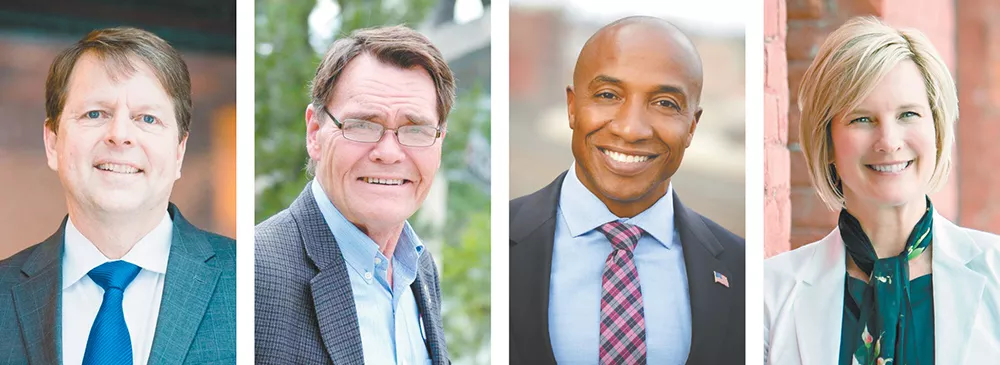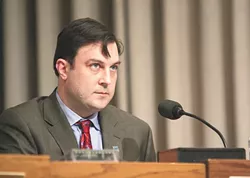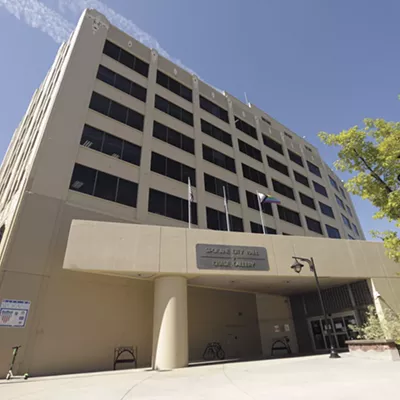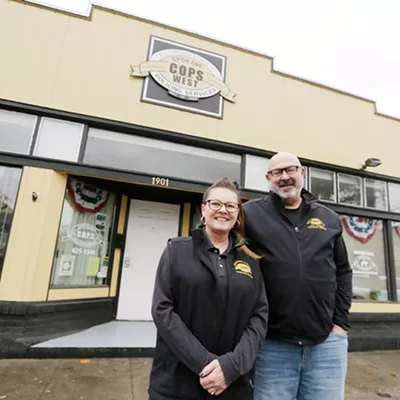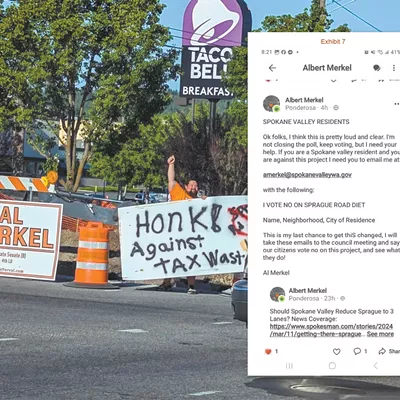The four candidates running to replace Ben Stuckart as Spokane City Council President — the only city council position elected citywide — are miles apart on some issues and create stark contrasts with their backgrounds. There's disagreement on how to address the homelessness crisis, as well as police oversight.
But the elephant in the room is this: One candidate, community leader and former NAACP president Phil Tyler, comes to the race with a litany of allegations of serious domestic violence hanging over his head.
Last year, the Inlander spoke with ex-wives of Tyler who described similar accounts of physical assault, verbal abuse, and death threats from him spanning decades. Two were interviewed on record while a third affirmed a written account of Tyler's abuse she had submitted to court. (Friends of the women and other court records helped substantiate the allegations.)
In an interview last week with the Inlander, Tyler continued to deny the allegations but largely declined to comment further.
"I don't believe these [questions] are germane to a very important race," he says. "Allegations are allegations. And we won't talk about that."
"Bringing the matters up over and over does nothing to help people heal," he adds. "I am no longer in those relationships."
Tyler's competitors in the race have all sounded off on the relevance of the allegations. Council member Mike Fagan, who has represented northeast Spokane as a constituent-minded conservative since 2011, laid into him as "unequivocally disqualified" from serving as council president.
"The preponderance of the evidence is just overwhelming," Fagan adds. "There's no doubt in my mind that the allegations are true."
The other incumbent, council member Breean Beggs, who was appointed to the City Council in 2016, was more reluctant to write-off Tyler completely.
"I haven't had any problem with him being on the slate of candidates that voters get to choose from," he says. "What I would love for Mr. Tyler is to, in some way, acknowledge what happened before, and explain where he was then and how he's changed."
Cindy Wendle, a pro-business political newcomer and commercial real estate asset manager at Northtown Square, punted on the question of whether somebody accused of serious domestic violence like Tyler should hold a position of power.
"It's up to the voters to decide," she says.
Meanwhile, the Spokane chapter of the National Organization for Women (NOW), argues the conduct that Tyler is accused of makes him unfit for office.
"His history has already shown that he cannot be trusted," Leann Ledford, vice president of Spokane NOW writes in a statement. "With a position on the City Council as president, Tyler would have an even wider ability to enact harm over our community, especially those who are marginalized, disadvantaged and are survivors."
Tyler's alleged history of domestic violence isn't the only issue. Homelessness, housing affordability and criminal justice issues are top priorities for most of the candidates — Tyler included.
Wendle is pitching herself as a pro-business pragmatist. She rails against current elected leadership for pursuing "political agendas" like council member Beggs' past effort that would've levied fees on coal and oil trains. Voters ultimately rejected it in 2017.
Wendle also says that the council has done little to address the concerns of residents and businesses regarding the local homeless population and related issues, such as panhandling, and is currently against levying any new taxes to pay for additional investments in homelessness. Some of her biggest campaign donors are the Spokane Association of Realtors and the Associated Builders and Contractors.
"We don't have anyone on the council who is in the middle with common sense," she says. "It's from the far left and the far right."
The two incumbents in the race, Beggs and Fagan, embody this notion to an extent. Fagan is the sole conservative voice on the City Council and has participated in anti-abortion protests outside Planned Parenthood. He also co-hosts a radio show Right Spokane Perspective and, last May, spoke at a fundraising event in Spokane Valley for Liberty State, a conservative movement that seeks to make Eastern Washington into its own state.
Beggs, in contrast, is a civil rights attorney who previously represented the family of Otto Zehm in a successful lawsuit against the city over his death at the hands of Spokane Police officers. He's also become a prominent left-leaning proponent for reform in debates on criminal justice issues. Beggs' donor list is chock-full with labor unions such as SEIU 775 and the Spokane Firefighters Union, as well as other liberal organizations, like the Washington State Democrats and the Washington Alliance for Gun Responsibility.
Both, however, pitch themselves as collaborative pragmatists versed in city policy and governance who are well-suited to take the mantle of council president. But Fagan, who has been sporting "Fearless Fagan" T-shirts during the campaign, isn't shying from arguing that Beggs is "a bit more meek" than himself.
"Don't think that we don't get along and we don't work together because we do," Fagan says.
"I've been a council member representative that really represents all people, doesn't really favor one agenda over another, and figures out the common ground," Beggs says. "I think we could use more of that in the city."
When it comes to potential solutions for homelessness, Wendle says that city leaders need to coordinate with Spokane County and neighboring counties to create a "regional taskforce" to pool information and best practices for responding to regional homelessness. At the moment, several entities already exist that seek to coordinate the local response to homelessness, including the Spokane Homeless Coalition and the Continuum of Care governing board.
"I want to identify all the nonprofits in our county, see what they need and what they're providing and where the gaps are," she says. "That's how we start addressing what we need to do."
"We have to answer the question of why people are homeless," she adds. "I want to know the facts before I deploy money and resources."
Wendle disputes the notion that a lack of affordable housing is the primary driver of homelessness, arguing drug addiction and mental illness are stronger factors.
Tyler, meanwhile, says that he doesn't support the Housing First model championed by Mayor David Condon and the City Council. Housing First aims to address homelessness by getting people housed before addressing addiction and mental health issues. Tyler says that the city should identify strategies that have demonstrated results before spending money, adding that he's a "big proponent" of the city's community court.
Fagan says the proliferation of illicit drugs in Spokane is heavily contributing to homelessness — and that the city should look into using state law to involuntarily commit mentally ill and drug-addicted persons to treatment. He also wants to see more cops in downtown Spokane.
Beggs points towards affordable housing as the most "urgent priority" for the city, including emergency shelter for the homeless as well as long-term affordable housing.
"We need more shelter space with 24/7 services. You need to have storage so that people [can] leave their things there instead of carrying them around in shopping carts... and bags," he says. "And you need to have showers so that people can get ready for a job interview."
Beggs also says he doesn't think that sobriety should necessarily be required from drug-addicted persons seeking services or shelter.
"If you require people to get clean and sober before they get any services, they will do neither, essentially," he says. "It takes internal fortitude and a lot of outside support to beat addiction. And if you're literally freezing to death outside and you don't know where your next meal is coming from, you're much less likely to summon that fortitude to conquer that addiction."
There's overlap between all the candidates in their belief that the city needs to adjust its zoning and building code laws to allow developers to build denser, more diverse housing and, ultimately, cool the local market.

